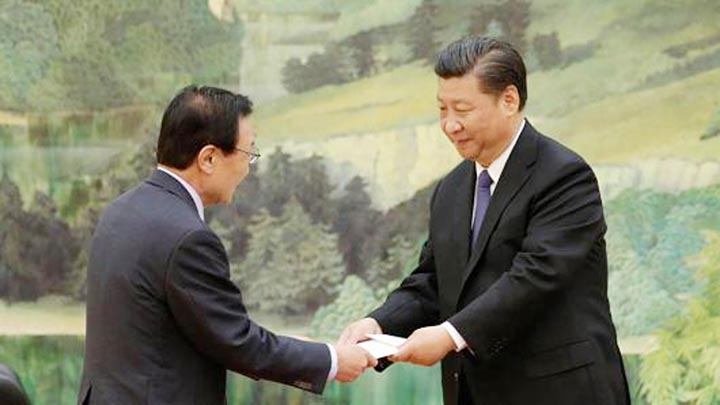
Reuters, Seoul/Beijing :
Seoul and Beijing on Tuesday agreed to move beyond a year-long stand-off over the deployment of a U.S. anti-missile system in South Korea, a dispute that has been devastating to South Korean businesses that rely on Chinese consumers.
The unexpected detente comes just days before U.S. President Donald Trump begins a trip to Asia, where the North Korean nuclear crisis will take center stage, and helped propel South Korean stocks to a record high.
The installation of the U.S. Terminal High Altitude Area Defense (THAAD) system had angered China, with South Korea’s tourism, cosmetics and entertainment industries bearing the brunt of a Chinese backlash, although Beijing has never specifically linked that to the THAAD deployment.
Beijing worries the THAAD system’s powerful radar can penetrate into Chinese territory. “Both sides shared the view that the strengthening of exchange and cooperation between Korea and China serves their common interests and agreed to expeditiously bring exchange and cooperation in all areas back on a normal development track,” South Korea’s foreign ministry said in a statement.
Before the THAAD dispute, bilateral relations flourished, despite Beijing’s historic alliance with North Korea and Seoul’s close ties with Washington, which includes hosting 28,500 U.S. troops. China is South Korea’s biggest trading partner.
“At this critical moment all stakeholders should be working together to address the North Korea nuclear challenge instead of creating problems for others,” said Wang Dong, associate professor of international studies at China’s Peking University.
“This sends a very positive signal that Beijing and Seoul are determined to improve their relations.”
As part of the agreement, South Korean President Moon Jae-in will meet Chinese President Xi Jinping on the sidelines of the summit of Asia-Pacific Economic Cooperation (APEC) countries in Vietnam on Nov. 10-11.
South Korea recognized China’s concerns over THAAD and made it clear the deployment was not aimed at any third country and did not harm China’s strategic security interests, China’s foreign ministry said.
China reiterated its opposition to the deployment of THAAD, but noted South Korea’s position and hoped South Korea could appropriately handle the issue, it added.
“China’s position on the THAAD issue is clear, consistent and has not changed,” Chinese Foreign Ministry spokeswoman Hua Chunying told a daily briefing in Beijing.

